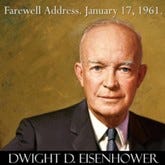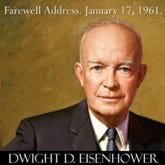It is time to ask a serious question. It is not a hypothetical question. Are you willing to push the world to the edge of a nuclear World War III to enrich the Military-Industrial complex?
Dwight Eisenhower was the commanding general of Allied forces in Europe. He led the campaign against Hitler. He won the 1952 Presidential election and, as he was leaving office, warned about the development of an alliance between defense contractors, senior military officers, and members of Congress who would seek reasons to spend endlessly on weapons and other defense-related items. Members of both parties go along if the money flows to their state, district, or, to be blunt, campaign coffers. Of course, to do this, there must be a war or at least an enemy.
In addition to providing a reason for spending, war creates a crisis environment, giving the government reasons for tighter security measures at home. In George Orwell's 1984, Oceania was constantly at war. Amazingly, on one occasion, their opponent and allies change places in one day. Eurasia and Eastasia swap roles, and the Ministry of Truth states that today's enemy has always been the enemy.
The most vigorous opponents of Putin and Russia can be found among those who were formerly the strongest anti-anti-communists. Putin is now the enemy since they still think he is the reason Trump won in 2016. It annoys Trump because "the Donald" thinks he had a lot to do with his victory. Those who voted against Hillary know she can lose an election without outside help.
Putin's enemies on the American left foolishly and dangerously mention regime change in Russia to punish him for his alleged role in 2016. Russia is not Iraq or Libya. It's not Afghanistan. Russia is a country with a massive nuclear arsenal, submarines, and other methods of delivery. Putin will not tolerate regime change. Also, the notion that his idea of Russia's position vis-à-vis the West is that of a madman is absurd. His understanding is entirely in line with the conventional Russian view.
After World War II, the Soviet Union was an actual enemy. In 1987, Ronald Reagan challenged Mikhail Gorbachev to "tear down" the Berlin Wall. That wall came down in 1989. Russia had historical reasons to fear the reunification of Germany. Their counterpart to NATO, the Warsaw Pact, ended on March 31, 1991. They saw no need for NATO to continue. Indeed, they did not know why a Western military alliance had to come closer to them, and they thought they had assurances it wouldn't.
Page 5 of a transcript of a February 9, 1990 conversation between Mikhail Gorbachev and James Baker has the following words from Baker:
We understand that not only for the Soviet Union but for other European countries as well, it is important to have guarantees that if the United States keeps its presence in Germany within the framework of NATO, not an inch of NATO's present military jurisdiction will spread in an eastern direction.
The failure to keep this promise led to further problems.
U.S. Secretary of State James Baker's famous "not one inch eastward" assurance about NATO expansion in his meeting with Soviet leader Mikhail Gorbachev on February 9, 1990, was part of a cascade of assurances about Soviet security given by Western leaders to Gorbachev and other Soviet officials throughout the process of German unification in 1990 and on into 1991, according to declassified U.S., Soviet, German, British and French documents posted today (December 12, 2017) by the National Security Archive at George Washington University
(https://nsarchive.gwu.edu/).
. . . . .
The documents reinforce former CIA Director Robert Gates's criticism of "pressing ahead with expansion of NATO eastward [in the 1990s], when Gorbachev and others were led to believe that wouldn't happen." [1] The key phrase, buttressed by the documents, is "led to believe."
From Russia's view, the commercial expansion of Europe to the East by the European Union and even the addition of former Warsaw Pact countries to the Eurozone weren't problems. Still, NATO countries can and do have military and missile bases capable of threatening Russia. That is unacceptable. If President Kennedy could object to missiles in Cuba in 1962, why can't Russia object to missile bases close to them?
In an article in Imprimus magazine, John Fonte describes the division in the Republican party between people like Liz Cheney and Donald Trump. Cheney is a "neocon in foreign policy and a chamber-of-commerce economic republican. MAGA Republicans are neither. In terms of foreign policy, Fonte illustrates Neocon policy by quoting George W. Bush, who
declared in 2005 that it would henceforth be the goal of U.S. foreign policy "to seek and support the growth of [democracy] in every nation and culture, with the ultimate goal of ending tyranny in our world."
As you can imagine, the Russian leaders think they can choose their government. Also, the so-called "color revolutions" in Eastern Europe, including the 2014 Ukraine putsch, were far from spontaneous, and the Russians know it.
Trump is proud that no wars started in his first term. There is much more history about Russia, Ukraine, and the multi-ethnic nature of Ukraine. The expenditures in Ukraine by European nations, especially Germany and Great Britain, are causing severe political and economic turmoil in those countries.
Two major Trump nominees, Tulsi Gabbard (D.N.I.) and Pete Hegseth (Defense), oppose the Neocon vision. Hegseth was a Major in the Army Reserves. Gabbard is a Lt. Colonel in the Army Reserves. They both served in combat areas.
We are about to see some fantastic grandstanding. I can assure you Trump and Gabbard will be called Putin's puppets because they will take a position short of declaring nuclear war on Russia. They won't even want to triple our national debt to let more Ukrainians die pointlessly. They understand the area's history and will work to get an arrangement to end the violence and provide peace.



